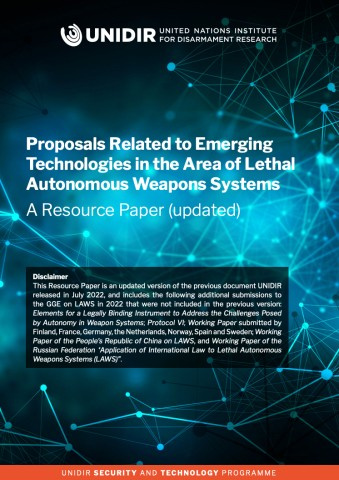Alisha Anand, Ioana Puscas
 This resource paper offers a comparative analysis of the content of the different proposals related to emerging technologies in the area of lethal autonomous weapon systems (LAWS) submitted by States to the Group of Governmental Experts on LAWS up until the end of 2022.*
This resource paper offers a comparative analysis of the content of the different proposals related to emerging technologies in the area of lethal autonomous weapon systems (LAWS) submitted by States to the Group of Governmental Experts on LAWS up until the end of 2022.*It identifies commonality in views as well as areas that require further discussion in relation to eleven thematic areas covered in the proposals and the Group’s discussions. These include:
Application of International Humanitarian Law (IHL)
Weapons prohibitions and other regulations/restrictions
Application of International Human Rights Law (IHRL) and International Criminal Law (ICL)
Characterisation
General requirements regarding human-machine interaction and human control
Responsibility and accountability
Legal reviews
Risk mitigation
Ethical considerations
Peaceful uses of Artificial Intelligence (AI)
Potential benefits of autonomy in weapon systems
Also available: Annex A, which includes relevant excerpts from proposals related to emerging technologies in the area of lethal autonomous weapons systems.
* This Resource Paper is an updated version of the previous document UNIDIR released in July 2022, and includes the following additional submissions to the GGE on LAWS in 2022 that were not included in the previous version: Elements for a Legally Binding Instrument to Address the Challenges Posed by Autonomy in Weapon Systems; Protocol VI; Working Paper submitted by Finland, France, Germany, the Netherlands, Norway, Spain and Sweden; Working Paper of the People’s Republic of China on LAWS, and Working Paper of the Russian Federation “Application of International Law to Lethal Autonomous Weapons Systems (LAWS)”.
SPONSOR ORGANIZATION
Support from UNIDIR’s core funders provides the foundation for all of the Institute’s activities. Both this paper and the original resource paper were prepared with supported from the Governments of New Zealand and Switzerland. This paper was prepared by UNIDIR’s Security and Technology Programme, which is funded by the governments of Czechia, Germany, Italy, the Netherlands and Switzerland, and by Microsoft.
No comments:
Post a Comment